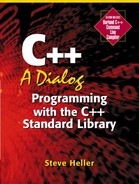M
Machine address; see memory address.
Machine code is the combination of machine instructions and the data they use. A synonym is object code.
A machine instruction is one of the fundamental operations that a CPU can perform. Some examples of these operations are addition, subtraction, or other arithmetic operations; other possibilities include operations that control what instruction will be executed next. All C++ programs must be converted into machine instructions before they can be executed by the CPU.
A machine language program is a program composed of machine instructions.
A magic number is a number that does not have any obvious relationship to the rest of the code. A good general rule is that numbers other than 0, 1, or other self-evident values should be defined as const or enum values rather than as literal values such as '7'.
Manager object; see manager/worker idiom, polymorphic objects.
The manager/worker idiom (also known as the “envelope/letter idiom”) is a mechanism that allows the effective type of an object to be determined at run time without requiring the user of the object to be concerned with pointers. It is used to implement polymorphic objects in C++.
A manipulator is a member function of one of the iostream classes that controls how output will be formatted without necessarily producing any output of its own. Manipulators operate on fields; a field can be defined as the result of one << operator.
A member function is a function defined in a class interface. It is viewed as “belonging” to the class, which is the reason for the adjective “member”.
A member initialization expression is the preferred method of specifying how a member variable is to be initialized in a constructor. Also see inheritance.
A member initialization list specifies how member variables are to be initialized in a constructor. It includes two types of expressions: base class initializers and member initialization expressions. Also see inheritance.
A member variable is a variable defined in a class interface. It is viewed as “belonging” to the class, which is the reason for the adjective “member”.
Memberwise copy means to copy every member variable from the source object to the destination object. If we don't define our own copy constructor or assignment operator for a particular class, the compiler-generated versions will use memberwise copy.
A memory address is a unique number identifying a particular byte of RAM.
A memory hierarchy is the particular arrangement of the different kinds of storage devices in a given computer. The purpose of using storage devices having different performance characteristics is to provide the best overall performance at the lowest cost.
A memory leak is a programming error in which the programmer forgot to delete something that had been dynamically allocated. Such an error is very insidious because the program appears to work correctly when tested casually. When such errors exist in a program, they are usually found only after the program runs apparently correctly for a (possibly long) time and then fails because it runs out of available memory.
A modification expression is the part of a for statement executed after every execution of the controlled block. It is often used to increment an index variable to refer to the next element of an array or vector; see for statement for an example.
Modulus operator; see %.
A month number is an integer value representing the number of months between two dates.
